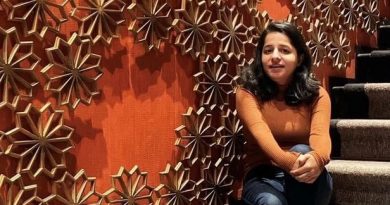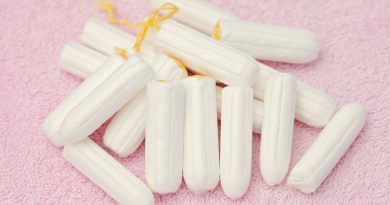This International Women’s Day women break period taboos to fight plastic pollution’
International Women’s Day has been building momentum over the years, and has slowly become a favourite holiday amongst many women worldwide. While most people use the occasion to celebrate how far women have come in their struggle for equality, some are taking it a step further – and embracing the opportunity to advocate for both women’s rights and the environment by lobbying for the removal of plastic from menstrual products.
For International Women’s Day (8th of March), 4 women are speaking out about the most controversial form of plastic pollution – the plastic that comes from our period products. Menstrual products are now the fifth most common item found on Europe’s beaches – more widespread than single-use coffee cups, cutlery, straws or even plastic bags [1]. This plastic pollution kills marine life and makes its way into our food chain in the form of microplastics.
Cal Major, world record breaking stand-up paddle-boarder, Yvette Curtis, surfer and founder of an all-girls surf club, Libby Bowles, adventurer and marine conservationist and Natalie Fee, founder of environmental campaigning organisation City to Sea, are joining forces to raise awareness and empower women to make informed choices about the period products that they use.
Natalie Fee, founder of City to Sea who run the campaign Plastic Free Periods [6] said “We wouldn’t choose to eat plastic, so why are we putting it inside our bodies every month? It’s time we shone a light on the hidden plastic in period products, and let women make informed choices about how to live healthy, sustainable lives that don’t cost the earth. Or the oceans.”
Currently a staggering 4.3 billion tampons, period pads and liners are used in the UK every year [2] with most of them containing single-use plastic in some form. Research shows that disposable menstrual pads sold by most big brands contain around the same amount of plastic as 5 carrier bags [3]. Tampons also contain a plastic weave, which is hidden from citizens. An estimated 1.5 – 2 billion of these are flushed in the UK every year [4], creating sewer blockages and ending up as pollution on our beaches or in our ocean.
But the tide is turning on both plastic pollution and period stigma. There are now a huge number of sustainable products helping people across the globe to turn the tide on plastic pollution from periods. These products include organic/plastic-free disposable tampons, pads and liners; reusable tampon applicators; menstrual cups, period pants and washable pads. Although cups, period pants and reusable pads are more expensive than disposable products to buy up front, huge savings can be made in the long term. In fact, over someone’s menstruating lifetime they can save up to 94% of what they would have spent on disposables by switching to reusables [5].
5 amazing things happening in the campaigning space enabling and empowering women to choose what they put in their bodies every month.
- City to Sea campaigned for the Department for Education to offer plastic-free products to schools as part of their period poverty scheme, and now schools can order organic tampons and pads, reusable pads and menstrual cups for students [6].
- This isn’t the only work being done with young people – City to Sea, Wen, Hey Girls, and Brook are all are all working to make sure up to date period education reaches students and community groups. City to Sea’s free school program Rethink Periods will have reached more than 31,000 students in the last 6 months alone [7].
- The Environmenstrual Coalition – a group of more than 60 organisations working to improve availability and access of sustainable menstrual products in the UK [8] have successfully worked with both Aldi [9] and Sainsburies [10] to ditch single-use plastic from their tampon applicators.
- Over the past year more than 8 new plastic-free products have been introduced across 5 major high-street retailers.
- In the past 5 years google searches for ‘menstrual cup’ have increased by 300% [11].
Judging by the campaign successes in this space over the last 5 years, it appears that plastic-free periods may be well on their way to becoming ‘the norm’. In an unexpected turn of events, plastic pollution could be the catalyst for breaking down taboos that have stopped people openly discussing periods for centuries.
Judging by the campaign successes in this space over the last 5 years, it appears that plastic-free periods may be well on their way to becoming ‘the norm’. In an unexpected turn of events, plastic pollution could be the catalyst for breaking down taboos that have stopped people openly discussing periods for centuries.
Quotes from Plastic Free Period Ambassadors
- Cal Major, world-record breaking stand-up paddle-boarder said “I was shocked by the amount of plastic pollution that I encountered during my paddle boarding expedition across the UK. Switching to reusable period products is one of the simplest ways we women can minimise our plastic footprint.”
- Surfer
and recently trained Environmenstrual Ambassador Yvette Curtis said “Learning to surf and play outdoors allows
women to reconnect with nature and themselves. Teaching my students about
plastic-free periods ties all of these elements together and provides a simple
solution to help protect the ocean.”
- “I’ve worked with 19,000 students and teachers globally; education is the greatest tool for creating positive change. Rethink Periods is educating people of all genders, ages and backgrounds and I’m really proud to be a part of such an amazing program.” said marine biologist and Rethink Periods teacher trainer Libby Bowles.
END
NOTES
TO EDITOR
About City to Sea and Plastic Free Periods:
City to Sea is an award-winning not-for-profit, campaigning to stop plastic pollution at source. They’re tackling the single-use plastic items found most commonly on our beaches and in our oceans by providing practical, solutions-focused initiatives and advocating reduce and reuse over single-use.
City to Sea’s Plastic Free Periods campaign aims to prevent plastic pollution from our periods by mainstreaming reusable and plastic-free disposable products and raising awareness that no period products should be flushed. Plastic Free Periods was launched in 2017 with a video that was viewed over 3 million times in the few weeks after publishing on facebook. Through Plastic Free Periods City to Sea lobbies government, works with the NHS, trains school teachers, influences retailers and educates the public. The campaign has been featured on BBC Women’s Hour, The Guardian, Metro, Positive News, Surf Girl and many more.
To find out more about plastic-free periods, access discount codes and read advice head over to www.citytosea.org.uk/plasticfreeperiods.
www.citytosea.org.uk @citytosea_
CONTACT
For any further comment and to arrange interviews please contact Plastic Free Periods campaign coordinator Jasmine Tribe: jasmine@citytosea.org.uk 07766306399.
REFERENCES
[1] https://ec.europa.eu/environment/circular-economy/pdf/single use_plastics_impact_assessment.pdf
[2] https://www.london.gov.uk/sites/default/files/plastics_unflushables_-_submited_evidence.pdf
[3] https://natracare.com/blog/how-much-plastic-in-sanitary-pads/
[4] Marine Conservation Society, Pollution Policy and Position Statement
[5] http://www.isonomia.co.uk/?p=4912
[6] https://www.citytosea.org.uk/free-period-products-program-launched-in-schools/
[8] https://www.wen.org.uk/coalition/
[9] https://metro.co.uk/2020/01/23/aldi-scraps-plastic-tampon-applicators-campaign-12109420/
[11] https://www.lanesfordrains.co.uk/global/news/future-period-care-products-will-look-like-20-years/
[11] https://www.lanesfordrains.co.uk/global/news/future-period-care-products-will-look-like-20-years/




